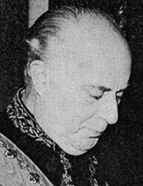

After less than two years, he was reappointed to Rome, this time to the Holy See, as full Ambassador. Relations between Portugal and the Roman Curia at that time almost reached their breaking point. On 1 July 1970 Paul VI granted audience to the heads of the Nationalist Movements of Angola, Mozambique and Guinea, which was not seen favourably by the Portuguese government. Eduardo Brazão was given orders to protest immediately. He considered this to be the most painful act of his entire career. His writing on the relations between Portugal and the Holy See, published in seven volumes by the International Academy of Portuguese Culture, which brought together numerous documents from the archives of the Portuguese diplomatic mission to the Vatican date from this period. The work, which was released out of chronological order, covers the pontificates of Pius VI, Pius VII, Gregory XVI and Pius IX: from the French Revolution to Napoleon (1790-1803 and 1803-1805), the recognition of D. Miguel (1831), the dramatic year of 1848 and the fall of Rome (1870).
Over the years, the political leanings of his youth tempered. He remained a monarchist but "now saw in Great Britain the ideal example of a monarchy of our times." He even accepted a form of democracy, "that could bring a moderate right wing to power". The fundamental evil, for the historian-diplomat, "was losing the true notion of a Christian society" (Memorial, p. 311 and 313). As a colleague and friend of Marcello Caetano since their university days, he held great hopes for his government. He was greatly disappointed. The revolution of 25 April 1974 took him by surprise, in the middle of his preparations to leave Rome. He eventually retired "in the interests of service" the following year. In 1983, once things had quieted down, recognition for his work was demonstrated in his appointment to join the Diplomatic Library Steering Committee, the body responsible for preparing its own publishing program, chaired by Calvet de Magalhães.
"I have never sought honours for myself, only benefits for Portugal," said Eduardo Brazão, for whom diplomacy was not 'luxury tourism', and who instead understood diplomatic work as "one of the most important roles to be performed, given the increasing need for understanding and living with others". In his application for reactivation to active duty, he claimed he had always sought to conduct policymaking with a “developed and serious sense of historical and cultural enlightenment”, with full awareness that it was impossible to understand contemporary Portugal “without delving deeper into and disseminating its past, its work, its immutable characteristics, the products of a long, well-defined life". For small countries, cultural activities promoted within embassies are the “sole means of not just valuing them, when they have a history rich in experiences, but above all of making them understandable in the troubling times in which we live."
